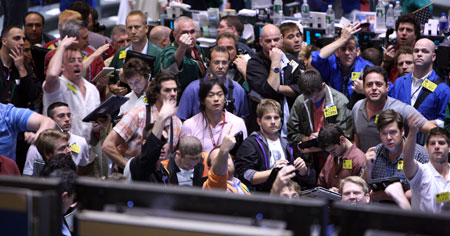 Traders work at the New York Mercantile Exchange in New York, the United States, June 27, 2008. (Xinhua Photo)
Traders work at the New York Mercantile Exchange in New York, the United States, June 27, 2008. (Xinhua Photo)
Oil prices broke the 140 U.S. dollars level for the first time this week, with August crude surging near 143 dollars a barrel on both New York Mercantile Exchange (NYMEX) and ICE Futures Exchange in London.
While oil has gained more than 40 percent this year, more and more people now shift their focus onto the role of speculators in the price hike. But is it all because of speculation?
Many believe so. A report the U.S. Congress released Monday showed that, in January 2000, 37 percent of the NYMEX crude futures contracts were held by speculative traders; but in April 2008, the number has soared to 71 percent. Meanwhile, the proportion of contracts held by commercial traders greatly declined.
The U.S. Commodity Futures Trading Committee (CFTC) revealed in May that it began investigating potential price manipulations in the oil trading market in December 2007. The early findings show that since the sub-prime mortgage crisis large amount of speculation fund has turned to buy commodities like crude as a hedge against inflation.
Speculation theory was also echoed by the Wall Street. Hedge fund manager Michael Master testified on May 20 that his pals in the Wall Street are pushing up world oil prices through speculative investment in futures market. Moreover, he pointed out at the hearing held by CFTC acting Chairman Walter Lukken on Monday that with greater regulation oil prices could drop to the level of 60 dollars a barrel within about 30 days.
Three days later, just after the oil prices surpassed 140 dollars point, the U.S. Congress approved a bill with a 402:19 vote that directs the CFTC to use its authority to curb speculation in the energy futures market.
However, some argue that "calling it speculation is way too simplistic"; or instead, speculation is more the consequence than the cause of a tight market.
When testifying before a U.S. Congress panel on June 3, billionaire Soros admitted that there are "strong fundamental factors" while labeling the oil prices hike as a bubble largely made by investment institutions through index fund.